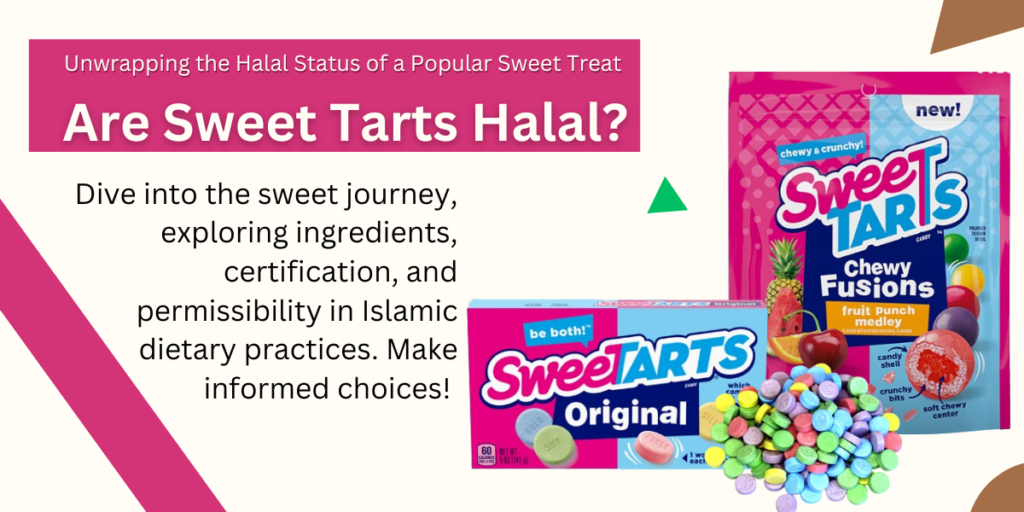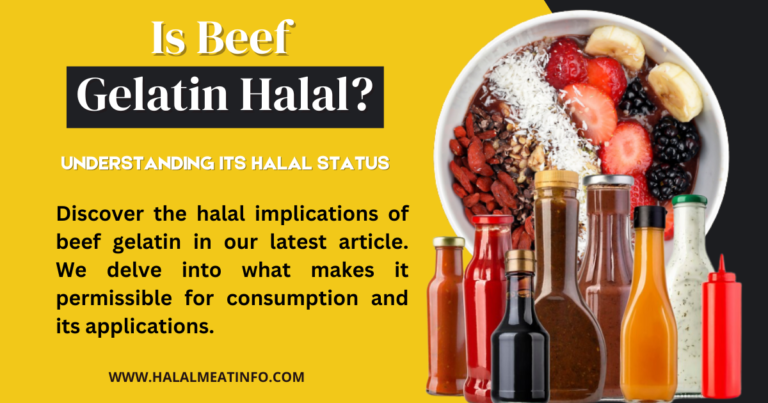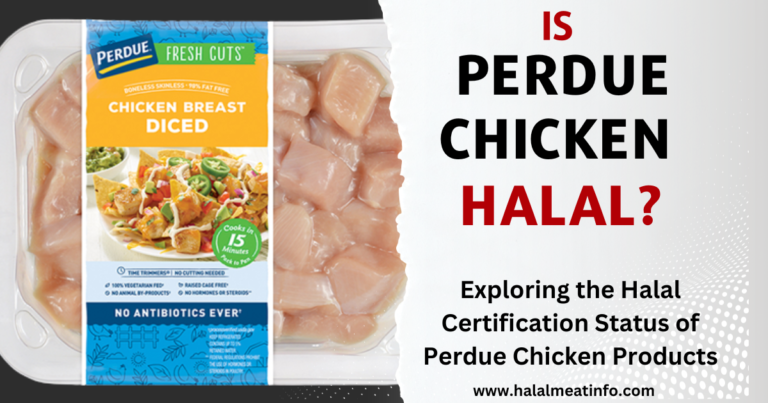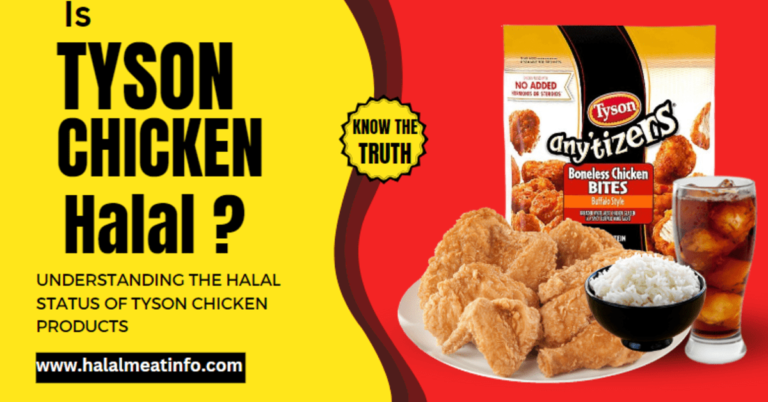Are Sweet Tarts Halal? A Comprehensive Examination
Sweet Tarts are a popular candy that has been around for decades. They are small, round, and come in an assortment of bright colors and fruity flavors. While these candies are loved by many, those who follow a halal diet may have questions: Are Sweet Tarts halal?
In this sweet investigation, we’ll reveal the ingredients, share insights into halal standards, and help you make informed choices when satisfying your sweet tooth. Whether you’re a candy connoisseur or someone navigating the halal dietary landscape, our journey together will shed light on the halal status of Sweet Tarts. Let’s dive into this flavorful journey and uncover the delicious truth about these iconic treats!

Introduction to the Wrigley Company
The Wrigley Company, renowned globally, started its journey as a small soap manufacturer. Its transformation into a confectionery titan is quite a captivating tale. Today, it stands as one of the largest and most influential candy manufacturers globally.
History of Sweet Tarts and Their Popularity
Sweet Tarts emerged in the 1960s, introduced by the Wrigley Company. Their instant popularity resulted from a distinctive combination of sweetness and tartness. These vibrant, bite-sized candies, embossed with a tiny heart, have been a favorite across generations. Their fruity flavors explode in your mouth, taking your taste buds on an unforgettable roller coaster ride of flavors. Since then, they’ve captured the hearts of millions, becoming a candy aisle staple. Their popularity transcends age and geography, making them a beloved treat worldwide [1].
But are these flavorful treats, so synonymous with fun and joy, compatible with a halal dietary lifestyle? Let’s delve into a detailed analysis.
Understanding Halal
“Halal” translates to “permissible” in Arabic. This concept is essential in Islam, as it dictates what is lawful and forbidden according to Islamic law, including food and drink. In terms of dietary rules, halal refers to foods and drinks that Muslims can consume under Islamic law. These guidelines concern the source of the food, the way it is processed, and how it is prepared.
Halal plays a crucial role in Muslim culture. It’s not solely a dietary rule but an act of faith obedience. Compliance with halal standards signifies a Muslim’s commitment to living a life in accordance with their religious beliefs. This adherence is widely seen as a form of worship, reflecting a deep spiritual connection to their religion.
With this in mind, the question arises: Are Sweet Tarts halal? The answer isn’t a simple yes or no, as it depends on several factors.
For more insights on the halal status of popular candies, you can read our detailed analysis on “Are Jolly Ranchers Halal?”.
Ingredients of Sweet Tarts
Sweet Tarts are comprised of several ingredients that contribute to their distinctive flavor and colorful appearance. The primary components include dextrose, maltodextrin, malic acid, and less than 2% of natural flavors, blue 1 lake, blue 2 lake, red 40 lake, yellow 5 lake, and yellow 6 lake [2].
Dextrose
Dextrose, a corn-derived sugar, is deemed halal. It is used widely in the confectionery industry to sweeten products. It not only enhances taste but also improves candy texture. Therefore, the presence of dextrose in sweet tarts is not an issue for those following a halal diet [3].
Maltodextrin
Maltodextrin, another corn or wheat sugar type. However, it goes through a different process than dextrose and may contain additives such as enzymes that could potentially be derived from non-halal sources. Therefore, some scholars may deem it non-halal, while others may consider it permissible as long as the source is not from an animal [4].
Malic Acid
Malic acid, an organic compound, provides the tart flavor to sour candies. It is typically derived from fruits, such as apples and berries, making it generally considered halal. However, some manufacturers may use synthetic forms of malic acid, which can be derived from non-halal sources. Therefore, it’s essential to verify the source of the malic acid used in sweet tarts [5].
Calcium Stearate
Calcium stearate, used as an anti-caking agent, is typically derived from animal fat. This may make it non-halal for some individuals following a strict halal diet [6].
Natural Flavors and Artificial Colors
The natural flavors and artificial colors used in sweet tarts are typically created through chemical processes, making their source difficult to determine. Some scholars may consider them halal, while others may deem them non-halal due to their uncertain origin [7].
Process and Production of Sweet Tarts
The production of Sweet Tarts is a harmonious blend of culinary art and science. The process begins with the creation of the candy base, comprising dextrose, maltodextrin, and malic acid. These undergo meticulous blending in large industrial mixers for the ideal sweetness-tartness balance. Following this, natural flavors and colors are added to this base mix to create the vibrant, fruity assortment of candies we all know. The mixture is then compressed into the iconic heart shape using bespoke molds. The penultimate stage involves polishing the candies to give them an appealing shine. Finally, they get sorted, packaged, and are set to delight candy enthusiasts globally. It’s essential to note that the entire process takes place in a controlled environment, adhering to strict safety and quality standards [8].
The Halal Status of Sweet Tarts
Various types of Sweet Tarts exist. Let’s examine the halal compatibility of each one.
Are Sweet Tarts Original Halal?
Although the Wrigley Company does not label Sweet Tarts as halal-certified, they do not contain any explicitly haram (forbidden) ingredients like pork gelatin or alcohol. Thus, some may deem them halal while others may refrain due to the ambiguity.
Ingredients of Sweet Tarts Original
Sweet Tarts are formed from various elements that grant them their unique taste and vibrant look. Primary elements include dextrose, maltodextrin, and malic acid. In addition to these, less than 2% of calcium stearate, natural flavors, and a range of food colorings – blue 1 lake, blue 2 lake, red 40 lake, yellow 5 lake, and yellow 6 lake are also present.
Based on the analysis of the ingredients, the status of Calcium Stearate, natural flavors, and artificial colors may be deemed questionable by some scholars. Hence, the halal status of Sweet Tarts Original may vary from person to person.
Are Sweet Tart Originals Ropes Halal?
Sweet Tarts Ropes, another popular product from the Wrigley Company, are gummy candies with a tart filling. They share some ingredients with original Sweet Tarts, but feature a few unique components as well.
Ingredients of Sweet Tarts Ropes
Sweet Tarts Ropes have a unique combination of ingredients that lend to their distinct taste and consistency. Key components involve sugar, corn syrup, and wheat flour. They also contain water and less than 2% of various ingredients such as citric acid, sorbitol, maltodextrin, and sodium citrate. Glycerin, malic acid, and gelatin are also present in the mix. The flavors in Sweet Tarts Ropes are derived from natural sources. The color is obtained from vegetable juice, and it also contains confectioner’s glaze (lac-resin), salt, and spirulina extract for coloring. Additionally, the colors beta-carotene and turmeric oleoresin are also used.
Upon analyzing the ingredients, it’s found that Sweet Tarts Ropes contain gelatin, which leads to their classification as non-halal.
Are Sweet Tarts Chews Halal?
Sweet Tarts Chews are another variant of this popular confectionery line. Like other Sweet Tarts products, they bring forth a tangy taste and a unique chewy texture.
Ingredients
The key ingredients include corn syrup, hydrogenated coconut oil, and less than 2% of maltodextrin, malic acid, citric acid, and natural flavors. The colors are derived from sources like blue 1 lake, red 40, yellow 5, and yellow 6. It is worth noting that Sweet Tarts Chews do not contain any gelatin, which is often a concern for halal compliance.
However, the halal status still depends on factors such as potential cross-contamination and the sources of natural flavors and colors. As with all food products, it is advisable to seek certification from a trusted halal authority.
Are SweeTarts Gummies Halal?
SweeTarts Gummies, another variant in this candy line, boast a fruity taste and a gummy texture.
Ingredients
Key ingredients encompass corn syrup, sugar, modified food starch, and less than 2% of apple juice concentrate, citric acid, and natural flavors. The colors are obtained from turmeric, vegetable juice, and spirulina extract. SweeTarts Gummies contain gelatin, usually derived from non-halal sources, rendering them non-halal.
How to Make Homemade Sweet Tarts
Creating your own Sweet Tarts at home is an enjoyable and rewarding process. Start by gathering all necessary ingredients: 1 cup of granulated sugar, 2 teaspoons of citric acid, 1 teaspoon of gelatin, and any food coloring or natural fruit juice for flavoring.
- Mix sugar, citric acid, and gelatin in a bowl.
- Slowly add water until the mixture achieves a dough-like consistency. Be careful not to make it too runny.
- Add food coloring or fruit juice to the mixture for flavor and color.
- Knead the mixture until it is smooth and evenly colored.
- Roll out the dough to about 1/4 inch thick and cut into desired shapes using a small cookie cutter.
- Allow the candies to dry for 48 hours or until they are hard and dry to the touch.
- Store in an airtight container and enjoy your homemade Sweet Tarts!
Remember, this recipe can be easily customized according to your own taste preferences and dietary restrictions.
Are Sweet Tart’s Halal in India, UK, US?
The certification of Sweet Tarts as halal varies based on region and the regulations set by local halal authorities. In India, UK, and the US, the classification of Sweet Tarts as halal or non-halal depends not only on the ingredients used but also on the production and packaging processes. The absence of explicit haram ingredients does not necessarily make them halal. For instance, cross-contamination with non-halal products during production could render them non-halal. Because the Wrigley Company does not label Sweet Tarts as halal, it is best to approach a local halal certification body to verify their status in your respective region.
FAQ’s
Sweet Tarts primarily consist of dextrose, maltodextrin, and malic acid, along with natural flavors and colors.
Original Sweet Tarts do not contain gelatin. However, some variants, like the Sweet Tarts Ropes and Gummies, do contain gelatin.
The halal status of Sweet Tarts varies among individuals and regions due to variations in personal beliefs, local halal regulations, and potential cross-contamination during production.
No, some variants of Sweet Tarts contain gelatin, which is an animal-derived ingredient.
The production of Sweet Tarts involves mixing the primary ingredients to create a candy base, adding flavors and colors, molding the mixture into shapes, polishing the candies, and finally packaging them.
Sweet Tarts are not gluten-free as some variants contain wheat flour. Always check the packaging for allergen information.
Yes, the Sweet Tarts line includes Original, Ropes, Chews, and Gummies, each with their unique ingredients and textures.
Conclusion
In the vibrant world of candies, Sweet Tarts stand out with their tangy taste and variety. While their ingredients mostly lean towards being halal, certain elements such as gelatin and natural flavors make their halal status debatable. Region-specific regulations and potential cross-contamination further complicate their halal classification. Consumers seeking halal products should carefully examine the ingredients and consider seeking guidance from a local halal certification body. Remember, when it comes to adhering to dietary restrictions, personal discretion and informed choices are paramount.






